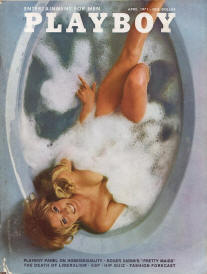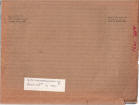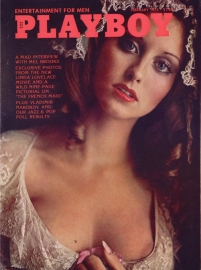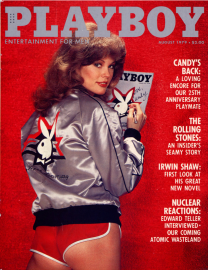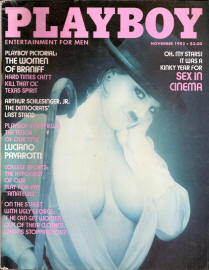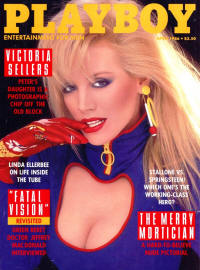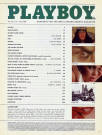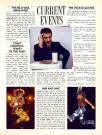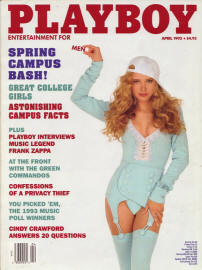Playboy
IT WAS A NICE California-daylight evening, and outside UCLA’s Pauley Pavilion (the house they built for Alcindor), the crowd milling about and queuing at the wickets looked to be about the size of any good sell-out crowd for the championship Bruin five. Except that its constituents were different. There were lots of lank-haired chicks with nice barefoot dirty feet (dirty bare feet always look cleaner than clean feet that have just been in shoes), lots of fringed buckskin and denim everywhere. Especially denim. Denim cutoffs with tailored leather seams, denim jackets with embroidery, with red reflectors, denim Levis for boys, for girls. Denim must be the one industry that is bullish these days. Because the latest scream is the poor look. Some of the holes at the knees even look as though they’ve been premeditatedly abraded with a nail file. And, in order to get the washed-out look, dumped into Mom’s automatic five or six times in succession. And, to fit like that around the ass, soaked in salt and put on wet. (read more)
The dairy cows of 18th Century Weimar disturbed the German poet Goethe at least as much as the turkey farms of Palmdale, California, bothered Frank Zappa in the Fifties. Yet, in spite of all the cow dung in the street, Goethe managed to write Faust, whereas Zappa for the life of him can't seem to get the turkey shit out of his head. And the latest live double album Roxy & Elsewhere (DiscReet) strongly indicates that the mother of invention is not about to clean house. Take the orchestral suite consisting of Village Of The Sun, Echidna's Arf (Of You) and Don't You Ever Wash That Thing? The trite lyrics of Village are so obviously geared to sell the purely instrumental sections of the composition to his audience of juvenile enfants terribles that the sales pitch needlessly commercializes and discredits the music itself. As do the lyrics of Penguin In Bondage, Son Of Orange County and Pygmy Twylyte. On the other hand, Cheepnis is a truly hilarious oratorio about TV science-fiction monsters that shows real insight into media psychology. Yet by side three, Zappa's artistic credibility is so low, even devoted fans must doubt whether the song contains anything more than the usual anti-establishment kitsch. Perhaps the most exasperating cut is Be-Bop Tango, where, stepping out of his maestro role and into his master-of-ceremonies personality, Zappa interrupts George Duke's fine scat singing to ... hold a dance contest! How long, O Lord, how long must we dial Frank Zappa and keep getting Bert Parks?
Source: the-eye.eu, killuglyradio.com
I'm very fond of stupidity. I think it's probably the most important and least understood aspect of American life. American society ... has a concept of coolness and cuteness ... both are factors of stupidity. ... Now that we've established diplomatic relations with China ... those people are ready for coolness, cuteness and stupidity. ... It's not getting any smarter out there. ... You have to come to terms with stupidity ... and make it work for you.
Source: the-eye.eu, killuglyradio.com
1982 November
Vol. 29 No. 11
20 Questions: Frank And Moon Unit Zappa
By David & Victoria Sheff, pp 174-175, 216-217
David and Victoria Sheff cornered the father of musical weirdness and his daughter (he has three other children: Dweezil, Ahmet and Diva) in the Zappas' Hollywood Hills home recording studio. The Shells' report: "Never second guess a man wearing shocking-purple blousy pants, a gray-silk shirt, pink socks and red tennis shoes with a silver z on them who once composed a piece of music titled 'Don't You Ever Wash That Thing?' And Moon seems like a very nice person, too." (read more)
Source: slime.oofytv.set
Interesting is not the short announcement about P.M.R.C. and Frank Zappa on page 125, but background story told by photographer Paul Natkin (Tipper Gore).
Paul Natkin:
So, one of my clients, Playboy Magazine, asked me to illustrate an article they were doing on the subject. They wanted as portrait of Frank, showing what would happen if the PMRC won. Frank was making an appearance at the “Limelight,” a club in Chicago. I arranged a quick photo session. I bought a quart of milk and a package of Vanilla Wafers, brought all of my stuff down there, set up a white background and wrapped a small box with white paper. I placed the milk and cookies on the block and waited. After a while, Frank was ushered into the room, laughed at the plan, sat down and a great shoot happened.
1993 April
Vol. 40 No. 4
Playboy Interview: Frank Zappa
a candid conversation with the most original mind in rock
music about world affairs, jewish princesses, fighting
cancer and life beyond the fringe
Interview by David Sheff, pp 55-56, 59-60, 62, 64-66, 68,
71-72
Music Poll Results
Hall Of Fame - Frank Zappa
p 136
Playboy: You once said that your job is "extrapolating everything to its most absurd extreme." Does that still hold true?
Frank Zappa: It's one of my jobs. I guess it must have been my main job that day. But yes, I like carrying things to their most ridiculous extreme because out there on the fringe is where my type of entertainment lies.
Playboy: Is it frustrating that more people don't get it?
Frank Zappa: The crux of the biscuit is: If it entertains you, fine. Enjoy it. If it doesn't, then blow it out your ass. I do it to amuse myself. If I like it, I release it. If somebody else likes it, that's a bonus.
Playboy: How important is it to offend people?
Frank Zappa: You mean, do I wake up and say, "I think I'll go out and offend somebody today"? I don't do that. I don't write lyrics much anymore, but I offend people just as much with the music itself. I put chords together that I like, but many people want rhythms that they can march to or dance to; they get tangled up trying to tap their foot to my songs. Some people don't like that, which is OK with me. (read more)
